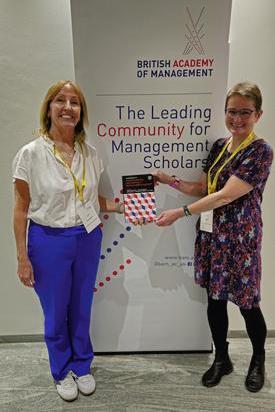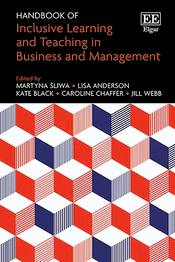Edited by

- Martyna Śliwa, Professor of Management and Organisation, University of Bath School of Management, University of Bath,
- Lisa Anderson, Professor of Management Learning, University of Liverpool Management School, University of Liverpool,
- Kate Black, Professor of Management Learning and Education, Newcastle Business School, Northumbria University,
- Caroline Chaffer, Associate Dean for Teaching and Learning - Student Experience, School for Business and Society, University of York
- Jill Webb, Associate Dean for Teaching, Learning and Students, Faculty of Social Sciences, University of York, UK

Summary
This comprehensive and wide-ranging Handbook offers insights into real-world classroom experiences of educators who have developed inclusive approaches to learning and teaching within schools of business and management. Written by leading practitioners from the British Academy of Management community, it provides good practice guides and examples of how to implement initiatives whose success is supported by evidence.
The Handbook of Inclusive Learning and Teaching in Business and Management covers four priorities for inclusive learning and teaching: curriculum content and assessment, belonging and engagement, learning environment and approaches, and digital and blended approaches. This Handbook will influence both the design and delivery of business and management learning and teaching, and the scholarship of inclusive learning and education.
Researchers and educators across – and beyond – different areas of business and management will benefit from this book’s engaging and accessible content. It will also prove useful for students aspiring to become tenured academics.
GET YOUR COPY HERE
Contents
- Introduction to the Handbook of Inclusive Learning and Teaching in Business and Management 1
Martyna Śliwa, Lisa Anderson, Kate Black, Caroline Chaffer, and Jill Webb - PART I CURRICULUM CONTENT AND ASSESSMENT
- The gap between rhetoric and reality: an audit of postgraduate curricula for evidence of equality, diversity, and inclusion 14
Christina Schwabenland, Alexander K. Kofinas, and Kevin Hainsworth - Democratising the curriculum: inclusive learning through students’ ownership of assessment 34
Kate Black and Russell Warhurst - Embedding diversity, inclusivity, and democracy in the classroom 47
Juliet Kele and Steff Worst - Using Lego as a Serious Play (LSP) as an inclusive assessment strategy with economically, linguistically, and culturally disadvantaged students: the quest for social justice in management education 72
Eleni Meletiadou - A person-centred approach to researcher development for business management doctorates 88
Scott Foster, Julie Sheldon, Claire Hannibal, and Mollie Bryde-Evens
- The gap between rhetoric and reality: an audit of postgraduate curricula for evidence of equality, diversity, and inclusion 14
- PART II BELONGING AND ENGAGEMENT
- Micro-recognitions of voice as a route to student belonging and mattering 106
Laura Dixon, Lindsey Gaston, Scott Foster, Olatunde Durowoju, and Tony Wall - 7 Students as Partners: an operational system for EDIR-driven teaching and learning practice 125
Rebecca Liu and Sophie James - Inclusive pedagogic practices for business school executive education: facilitated belongingness and valued uniqueness 142
Nicola Patterson, Amy Stabler, Sharon Mavin, and Joanne James
- Micro-recognitions of voice as a route to student belonging and mattering 106
- PART III DIGITAL AND BLENDED APPROACHES
- A transformative learning and teaching approach to inclusive education 165
Ling Xiao, Lucy Gill-Simmen, and Niki Panteli - An exploration of engagement and learner success in fully online learning and implications for inclusive practice 183
Liz Matykiewicz, Jane Neal-Smith, and Susan Cox - Blending academic literacy and subject instruction: supporting international postgraduates through inclusive practices 199
Senika Dewnarain and Fatma Elshafie - Bridging the gap: utilising digital solutions to unite business students across various HE contexts 214
Stella Xu, Xue Zhou, and Ryan Arthur
- A transformative learning and teaching approach to inclusive education 165
- PART IV LEARNING ENVIRONMENTS AND APPROACHES
- Experiencing the journey to reflexivity together 232
Bob Townley, Jane Neal-Smith, and Gill Bishop - Inclusive professional education for sustainability: the Cranfield MSc Sustainability 247
Rosina Watson, Kenisha Garnett, and Rosina Borrelli - Inquiry-based learning as an inclusive approach to teaching international students 270
Helen Tracey and Diep Nguyen
- Experiencing the journey to reflexivity together 232
- Final remarks 285
Lisa Anderson, Kate Black, Caroline Chaffer, Martyna Śliwa, and Jill Webb - Index 287
